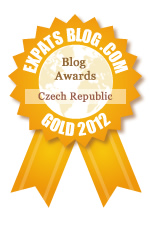 Since I start taking Czech lessons this week I figure I’ll share a bit more about the language. When you first look at written Czech with all of those accent marks it looks absolutely impossible.
Since I start taking Czech lessons this week I figure I’ll share a bit more about the language. When you first look at written Czech with all of those accent marks it looks absolutely impossible.But they may be on to something over here because, unlike English, pretty much everything is pronounced just as it is written. After learning the letters you can, more or less, pronounce everything right away. Unfortunately, even though you can say it, you still don’t know what it means in English. The only kicker here is that the stress is always on the first syllable of a word. It sounds easier than it is.
With the 3 different kinds of accent marks, there are 42 letters in the Czech alphabet.
a, á, b, c, č, d, ď, e, é, ě, f, g, h, ch, i, í, j, k, l, m, n, ň, o, ó, p, q, r, ř, s, š, t, ť, u, ú, ů, v, w, x, y, ý, z, ž
Notice that „ch“ is its own letter and comes after „h“. Also, the letters G, Q, W and X are only used in foreign words. Here are the main differences from (American) English pronunciation..
c = ts, as in cats. My last name gets pronounced „tsamargo“ here.
č = ch, as in church
ch = is glutteral, as in the Scottish word, loch
j = y as in yellow
ň = nya, as in onion
š = sh, as in shoe
ť = tya, as in stew
w = v. When you give a website you say "ve ve ve" instead of "double u double u double u".
ž = „zh“ or how the „s“ is pronouned in pleasure
r = a rolled R sound
ř = a rolled R sound with a „zh“ sound. This sound only exists in Czech. Even Slovaks, Poles and Russians have a difficult time trying to pronouce this one. When I try to say it, most people look at me as if I'm retarded.




























There is a saying...
ReplyDeleteMařeno řekni ř!
Neřeknu! Vy byste se mně řehtali!
Mařena say ř!
I won't! You would laugh at me:)
Fantastic post! Looking forward to more of your language learning adventures.
ReplyDelete